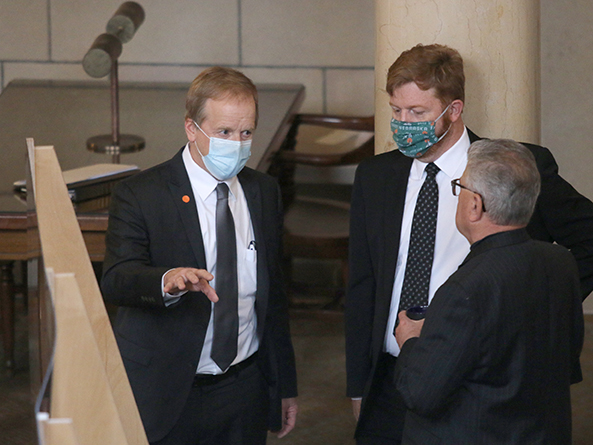Reduced ag land valuation for school bonding advanced
A bill intended to shift the cost of school bonds away from owners of farm and ranch land advanced from general file April 21.
Agricultural and horticultural land is valued at 75 percent of its actual value for purposes of property taxation under current law. Under LB2, as introduced by Albion Sen. Tom Briese, it would be valued at 30 percent of its actual value for purposes of school district taxes levied to pay the principal and interest on bonds issued on or after Jan. 1, 2022.
Under a Revenue Committee amendment, it would be valued at 50 percent of its actual value for that purpose.
In many rural districts, Briese said, farmland comprises much of the tax base, but residential homeowners outnumber farmers and ranchers at the ballot box. That disparity in tax burdens can encourage “excessive investment” in K-12 buildings through unnecessary bond votes, he said.
“From my perspective, [LB2] does not impose an onerous burden on anyone,” Briese said. “It simply injects more accountability into the voting decision and gives everyone a little more skin in the game.”
Sen. Curt Friesen of Henderson supported the bill. He said it would distribute more fairly the cost of retiring school bonds in districts where residential property owners outnumber farmers and ranchers, who pay a larger portion of the bond debt due to high agricultural and horticultural land valuations.
“When the majority, by far, of the tax dollars come from … the ag land,” Friesen said, “it’s pretty easy to vote for a tax increase that raises your taxes $1.50 and raises somebody else’s $100.”
Lincoln Sen. Matt Hansen opposed LB2 and filed a motion to bracket the bill until June 10, which effectively would end debate on it this session. He said the bill is intended to discourage school bonding in rural areas.
The motion failed on a vote of 6-34.
The committee amendment also included the amended provisions of Briese’s LB79, which would set the minimum amount of relief granted under the Property Tax Credit Act at $275 million per year through tax year 2023.
The act, passed in 2007, provides property owners with a tax credit based on the valuation of their property.
Although lawmakers likely will repurpose the property tax credit fund in the future — perhaps to increase state aid to schools — for now, Briese said, the Legislature should build it up in an effort to reduce Nebraska’s overreliance on property taxes to fund local government.
“It’s not perfect,” he said. “But it does go to every Nebraska property owner.”
Under the committee amendment, the minimum amount of relief each tax year would be the minimum amount from the prior year increased by 3 percent, beginning with tax year 2024.
Briese introduced an amendment to the committee amendment that instead would set the minimum amount of relief at $275 million for tax year 2021 and $313 million for tax year 2022, which he said would codify the amount appropriated to the fund in the current state budget.
Under Briese’s amendment, the minimum amount of relief would increase by 3 percent per year beginning in tax year 2023 rather than 2024.
After several senators expressed concerns about that provision, Briese withdrew the amendment and offered a floor amendment, adopted 25-11, that would exclude the annual increase and set the minimum amount of property tax credits at $313 million per year beginning in tax year 2022.
Sen. Anna Wishart of Lincoln opposed the floor amendment, saying that increasing the property tax credit fund’s statutory minimum would limit the Appropriations Committee’s flexibility when creating future budgets.
She said the state will spend approximately $1.45 billion, nearly 15 percent of its current budget, on the LB1107 credit and the property tax credit program during the current biennium.
“If that is not working,” Wishart said, “we need to figure out a different way to invest these dollars so that farmers and business owners and residential homeowners can actually experience that relief.”
North Platte Sen. Mike Groene introduced an amendment to strike any changes to the property tax credit fund. He said that portion of Briese’s proposal was unnecessary because any future Appropriations Committee is not likely to reduce the statutory minimum from $313 million.
Groene said his amendment would preserve the Revenue Committee’s proposal to reduce farmland valuations to 50 percent for the purpose of retiring school bonds. That change would be a “huge victory for rural Nebraska,” he said, by addressing an inequity in how school buildings are financed in districts where agricultural land makes up most of the tax base.
Briese supported Groene’s amendment, saying he would respect the concerns senators had about raising the property tax credit fund’s statutory minimum.
After adopting the Groene amendment 37-1, lawmakers voted 37-0 to adopt the committee amendment. They then advanced LB2 to select file on a vote of 38-3.


